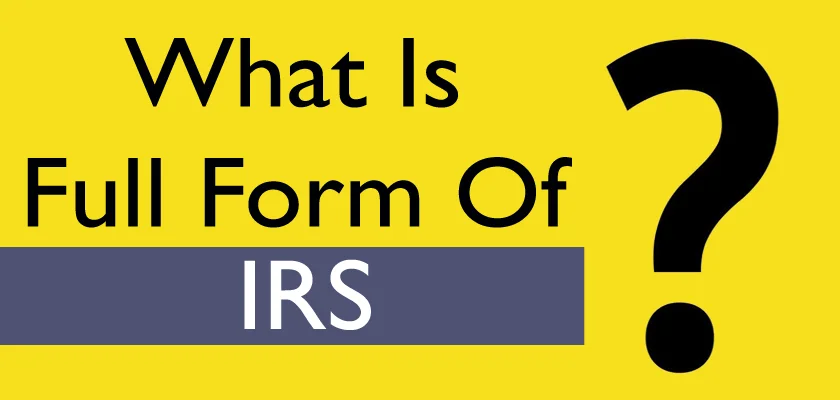Do you know what is the IRS Full Form? The IRS Full Form stands for Indian Revenue Service. It is also known as the administrative revenue service of the Government of India (GOI). Group services of the central civil services include the IRS service. The Department of Revenue in the Union Ministry of Finance is in charge of overseeing the IRS cadre. The duties of IRS officials range from dealing with the nation’s finances to enacting policies. The Income Tax Department (ITD), whose logo is “Kosha Moolo Dandah” (“Treasury is the root of administration”), is under the jurisdiction of IRS agents.
The collection of funds for development, security, and governance is one of the most significant sovereign tasks carried out by IRS employees. Two branches of the Indian Revenue Service (IRS) exist:
- IRS (Customs and Central Excise).
- IRS (Income Tax).
Table of Contents
What is the IRS Full Form?
In English, the IRS Full Form stands for Indian Revenue Service and in Hindi, the full form of IRS is भारतीय राजस्व सेवा.
What is the recruitment process of the IRS?
IRS officials are hired via the UPSC CSE test, which is operated each year. The prelims, mains, and interviews are the three stages of this test.
When IRS officers first join the agency, they get the majority of their training at Nagpur’s National Academy of Direct Taxes (NADT).
For trainee IRS officials, there is a 4-month-long Foundation Course. Following completion of the foundation course, IRS employees get intensive training for 16 months in specifically created modules on taxation and related accounting, legislation, fiscal policy, public finances, office practices, and other topics. They are also assigned to several field offices & organizations across India during the training period.
Additionally, they are sent outside of India to expose people to the greatest taxation techniques found everywhere.
What are the duties of an IRS officer?
The primary duty of IRS officers is to administer and collect all direct and indirect taxes payable to the Government of India. Responsibilities of an IRS officer include formulating tax policies, managing policy issues related to the investigation of tax evasion, resolving, updating and maintaining relevant laws, implementing direct tax policy with the help of its regional offices across the country and all related administrative management. Below are the duties of IRS officers related to indirect and direct taxes:
- IRS representatives also take part in bilateral and international discussions of fiscal treaties in organizations like the OECD and the Global Forum on Transparency in Tax Matters.
- Various intelligence and law enforcement agencies, including the Central Bureau of Investigation (CBI), the Research and Analysis Wing (RAW), the Intelligence Bureau (IB), etc., employ IRS employees.
- IRS agents carry out crucial border postings, maintain the nation’s economic boundaries, and prevent smuggling. They deal with high seas patrolling missions as well as proactive anti-piracy and smuggling activities.
- Identifying tax evasion is a major responsibility placed on IRS officials working in the customs and income tax departments. IRS agents are legally allowed to seek for and seize unlawfully acquired riches, as well as to detain anyone responsibly.
- Investigating and exposing fraud in the nation is mostly the responsibility of IRS agents.
What are the skills required for IRS officers?
These are some essential skills for IRS officers:
- Communication Skills
- Quality of Patience
- Analytical Skills
- Research Skills
- Leadership and Decision making skills
- Perseverance
What are the benefits of becoming an IRS?
- The privilege of posting in major cities is available to IRS officials.
- Since their employment is often restricted to conventional office hours, they may maintain a healthy work-life balance.
- In comparison to other civil services like IAS & IPS, there is also less pressure and almost no political meddling.
- The term of IRS officers is more stable; they can stay at a posting station for around eight years.
What are the eligibility criteria to become an IAS officer?
A candidate who aspires to become an IRS officer must acquire the following eligibilities:
Nationality: A potential employee of the Indian Revenue Service must fit one of the following criteria:
- A candidate must a citizen of India, Nepal, Bhutan
- An individual of Indian descent who has made a permanent stayed in India from Pakistan, Ethiopia, Sri Lanka, Myanmar, Kenya, Uganda, Zambia, Malawi, Tanzania, Zaire, or Vietnam.
Educational Qualification: A candidate must have the following educational qualification:
- Candidate must have a degree or equivalent qualification from a university recognized by the Govt.
- There is no minimum graduation qualifying mark requirement to sit in UPSC CSE (Civil Services Exam) exam. All that is required of candidates is graduation.
- Professional and Technical Qualification Candidates must possess a degree recognized by the Government as equivalent to a professional.
- The UPSC Preliminary test is also open to all candidates who are in their last year of high school. When applying for the Mains test, all such candidates must present their final year graduate pass certificate.
- The preliminary exam is also open to medical students who have passed the final year of their MBBS program but have not yet completed their internship. However, such applicants will have to submit proof of completion of the course at the time of appearing for the main examination (including internship).
Age Limit: The minimum age requirement for a candidate is 21 years old and while the maximum age limit is 32 years. There are various age restrictions in caste reservations:
- For OBC the upper age is 35 years,
- For General, the upper age is 32 years,
- And the ST/SC upper age is 37 years,
- And an exception to the upper age restriction is given to those applicants who are physically unable or who are behind the backward in terms of other factors.
Age Relaxation: The following is the relaxation of age in the IRS CSE exam:
- For OBC 3 years
- For the candidate of J&K 5 years.
- For SC/ST 5 years
- For with people disabilities 10 years.
Number of Attempts: The number of attempts as per the caste of the candidate is as follows:
- For OBC candidates (other backward classes), the number of attempts is 9
- For the General candidates, the number of attempts is 6
- However, for SC/ST candidates there is no limit
What is the exam pattern for IRS?
IRS exam consists of 3 parts – Prelims, Mains and Interview which is conducted annually by UPSC CSE.
Prelims: The preliminary exam consists of two papers- General Studies and CSAT. However, visually impaired applicants are given an additional time of 20 minutes for each paper in the preliminary examination. Both exams consist of multiple-choice questions which are objective in nature. Additionally, both publications are printed in English and Hindi.
| Paper | Marks | Duration |
| General Studies | 200 | 2 hours |
| CSAT | 200 | 2 hours |
Mains: Candidates who pass the preliminary test proceed to the main examination, which carries a total of 1750 marks. The list of final applicants is chosen based on main and interview scores. The main exam consists of a total of 9 papers. Out of the nine examinations, two are qualifying (minimum 25% marks required) and comprise 300 marks each for English and Indian language requirements. The remaining papers each have 250 marks. Listed below are the papers for the mains:
- Paper 1 (Language to be chosen by the candidate which is mentioned in the Eighth Schedule to the Constitution of India)
- Paper 2 ( Compulsory English)
- Paper 3 ( Essay)
- Paper 4 – General Studies I
- Paper 5 – General Studies II
- Paper 6 – General Studies III
- Paper 7 – General Studies IV
- Paper 8 – Optional paper 1
- Paper 9 – Optional paper 2
Another Brief knowledge of the IRS Full Form in the US
The IRS Full Form in the US is Internal Revenue Service. It is a branch of the US government in charge of tax collection and the implementation of tax regulations, including the wash sale rule. The collection of personal and employment taxes is the main focus of this service. This service is vital for managing taxes in the United States. To better understand the importance and operation of the Internal Revenue Service (IRS), we’ll take an in-depth look at the fundamentals of the IRS.

Other IRS Full Forms
| Term | Full Form | Category |
| IRS | Indian Revenue Service | Indian Ministry of Finance |
| IRS | Internal Revenue Service | US Federal Agency |
| IRS | Intermediate Reference System | Computer and Networking |
| IRS | Indoor Residual Spray | Chemistry |
| IRS | Intimate Relations Schedule | Messaging |
| IRS | I’m Really Sexy | Messaging |
| IRS | I Respect Someone | Messaging |
| IRS | Increasing Returns To Scale | Accounts and Finance |
| IRS | Internal Revenue Service | Accounts and Finance |
| IRS | Inertial Reference System | Space Science |
| IRS | Indian Remote Sensing | Earth Science |
| IRS | Institutional Representatives | Job Title |
| IRS | Interest Rate Swap | Stock Exchange |
| IRS | Sturgis (mi) | Airport Code |
| IRS | Inverse Repeated Sequence | Maths |
| IRS | Indoor Residual Spraying | Real Estate |
| IRS | Information Reporting System | Military and Defence |
| IRS | Interface Requirements Specification | Military and Defence |
| IRS | Information and Reconnaissance Ship | Military and Defence |
| IRS | Resource (WordPerfect) | File Type |
| IRS | In Range Shooting | Military and Defence |
| IRS | Infrared Spectroscopy | Electronics |
Thanks for reading What is the IRS Full Form? Bookmark our website Whatisfullform.com to know or read our collection of full forms.


